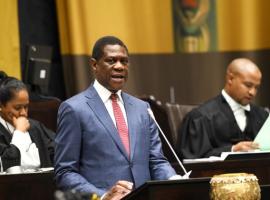
LONDON, Jan 18 (NNN-AGENCIES) — British Prime Minister Rishi Sunak got his government’s plans to send people seeking asylum in the United Kingdom to Rwanda for consideration to stay there instead through the lower house of Parliament on Wednesday.
Sunak had faced a potential rebellion from both the moderate and right flanks of his Conservative Party in a parliamentary vote on a policy he and the party have emphasized in recent months amid pressure from the right.
Lawmakers voted 320 to 276 to back the bill intended to overcome a UK Supreme Court block on the Rwanda plan. But the contentious immigration policy on which Sunak has staked his authority still faces political and legal hurdles.
Opposition leader Keir Starmer approached the issue from a different angle in Prime Minister’s Questions in the House of Commons, with his first in a series of questions to Sunak noting the government’s recent admission that it had lost track of around 85% of the 5,000 people originally earmarked for removal to Rwanda.
He asked if the government had been able to locate them, before going on to argue the policy was proving an expensive and ineffective one.
“It’s not a plan, it’s a farce. Only this government could waste hundreds of millions of pounds on a removals policy that doesn’t remove anyone,” Starmer said in the lower chamber of parliament, before listing other past problems for the plan.
“He hasn’t got a clue where they are, has he?” Starmer quipped to the chamber after not receiving an answer to his original question on the missing people. “I can tell you one place they aren’t, and that’s Rwanda. Because the only people he’s sent to Rwanda are government ministers.”
The government defeated a parliamentary motion from more hardline Conservatives to make the bill more stringent on Tuesday, but almost a fifth of the party’s lawamkers — more than expected — backed the proposal.
Two members of the party, Lee Anderson and Brendan Clarke Smith, resigned in protest, writing in their co-signed resignation letter: “Prime Minister, you pledged to do whatever it takes to stop the boats.”
The government needed votes from the opposition to secure an outright majority for dropping the changes.
Britain’s bid to relocate anyone entering the country illegally to Rwanda, where they could seek asylum instead with no prospect of residency in the UK, originally dates back to 2021, when Sunak was still former Prime Minister Boris Johnson’s finance minster.
Implementing the plan has proved challenging for successive Conservative governments, amid political and legal challenges alike.
The idea came soon after the completion of Brexit — once advertised to the public as a means to reduce migration — as both legal and illegal migration levels rose sharply despite the UK leaving the EU.
It also came amid pressure from the far-right, particularly former UKIP leader Nigel Farage, on the issue of migrants crossing the English Channel, often from France, in small boats.
The plan voted on on Wednesday aims to limit the scope people would have to challenge the process in the courts.
But the government said it was walking a fine line here because Rwanda had said it would only go ahead with a deal that was deemed not to breach international humanitarian law.
Hardliners want clearer language ruling out the chance of challenging at European courts, in particular, another pledge from the Brexit debate it’s proving difficult to honor.
In power since 2010, with Sunak the fifth prime minister during that period (and the third of this legislative period), the Conservatives trail the opposition Labour Party by a wide margin in the polls.
Elections must take place by January of next year and are likely a little sooner than that.
The EU is currently working on migration reforms of its own, with several member states recently mooting plans that sound at least reminiscent of those Britain’s government is struggling to realize. — NNN-AGENCIES






